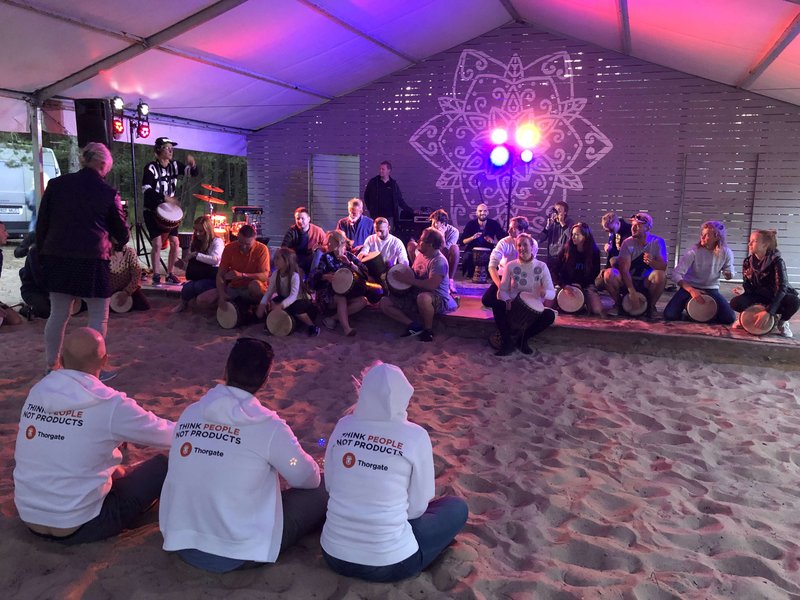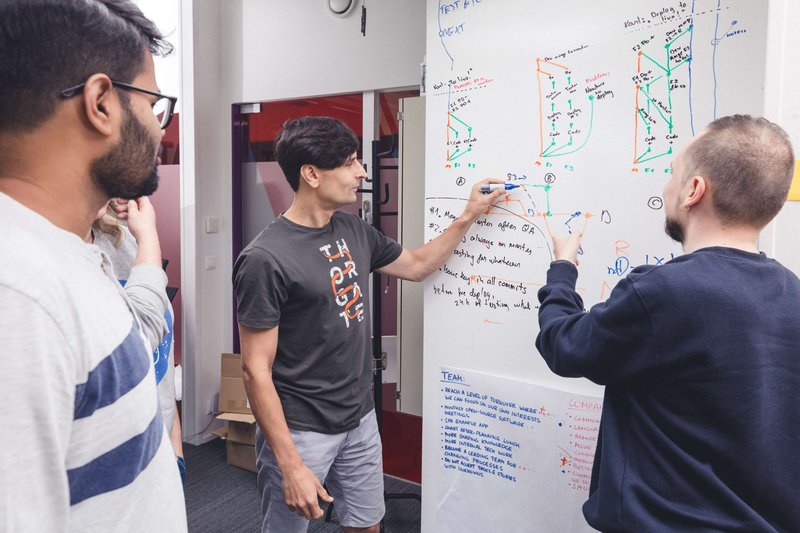Rituals are a powerful driver of culture in any company. At Thorgate, we have thoughtfully designed and nurtured our culture to reinforce the Thorgate values in our everyday work life. Companies practice rituals of all kinds - celebration rituals, eating rituals, storytelling rituals. Why are they important? Rituals engage people around the things that matter most to an organization, instilling a sense of shared purpose and experience. They spark behaviors that make the work and the company more successful. At Thorgate we’ve tried and tested many rituals to see what works best for people's development in specific. We kept in mind our values and unique purpose before we evaluated what were the things that can help us deliver on those. It was also important for us to think about what will make these rituals stick and why will people want to participate.
One-on-One
An important event for every employee at Thorgate is a one-on-one meeting every month. We follow a flexible format, talking about the highs, lows, goals and feedback of the person in focus. This works for every role in the organisation. On average these can last anywhere between one to three hours depending on the content of discussion and the relationship between the team member and his/her manager. One-on-one meetings help team managers understand each and every team member, guide them in line with the company ambitions, see where they can be facilitated by the company and create a two-way feedback stream. Some interesting parts of this meeting are for the person in focus to be able to set a goal for their manager, or to discuss personal goals. These meetings help us go over all our motivations and grievances in detail.
Team Training
We host regular team training events throughout the year, however, we have 4 compulsory training events that are bigger than others. We start the year with winter days where we deliver training and workshops about the company goals, foundations, culture and values. This is important for us to re-align with our vision at the beginning of every year. In the second quarter we organise a training or workshop around personal goal setting, helping team members set goals for their personal development in their role. The third quarter usually has a bigger training around topics like communication, time management, stress management etc. We end our year with training on future trends in innovation to help us plan the upcoming year.

Hackathons
Doing the right thing is more important than doing things right. Twice a year, we host an internal hackathon for our people to work on their idea, or a side project in a team helping them create what they want and learn while they’re at it! Hackathons have brought us a lot of good things like Waybiller, an e-waybill software that we created during one of our recent hackathons. It is now a successful spin-off for Thorgate.
Personal Mentorship
Every new member at Thorgate is greeted by a personal mentor who is happy to guide along the way helping them grow to their best self. A personal mentor can usually be your own manager, unless someone specifically asks for another person. The role of the mentor is not only to facilitate the general career growth of the team member but also mentor them in their personal growth such as acquiring certain life skills that can help them in their career and other ways.
Team Retros
The goal of the team retros is to sync everyone’s week. Every Friday we have team retros where everyone tells their positives and negatives from the week. We celebrate the positives together and then brainstorm on how to solve any problems that are brought forward or avoid any problems similar to what a team member faced during the week.
PPP Meetings
Another weekly ritual we have is a PPP meeting. The format of the meeting is that we discuss progress, plans and problems. A normal PPP meeting is a short overview given by each team member to their manager about their accomplishments or progress at work, plans for the coming few weeks and any problems that need attention.
Team Overviews
We also have monthly team overviews for the rest of the company. These are sales overview, efficiency overview, and events overview. As the name suggests, the head of business development shows sales and marketing metrics and performances of individual team members as well as their accomplishments from the previous month. As for the efficiency overview, this is done by the CTO/COO, with metrics related to the work put in by the engineers, smart working and project satisfaction. Events overview is led by the culture officer, and usually talks about the company eNPS, past events’ feedback as well as the company events in the pipeline. Another activity among the Monthly Friday overviews is ‘Grilling the CEO’. This is to maintain utmost transparency in the company, where everyone is invited to send questions anonymously (or not - if they choose) to the CEO directly, and he answers those questions in front of the company. Most questions are about future plans, how to fix our mistakes and the general company vision.
Quarterly/Year-on-year reviews
As transparency and reporting are key in our work culture, we also look at the bigger picture each year, or mid-year. This means that we set goals for the upcoming year/6 months and we organise a presentation with the whole company to discuss our progress on goals we set earlier, and what we want to do in the future. This really helps us stay aligned with the bigger vision while keeping each and every team member in loop.Feedback Loop at Thorgate
At Thorgate, we use the 3C’s to make everything work: Communication, Communication and Communication! This is the biggest part of all our processes, concise yet clear communication. It helps us make our process lean and efficient. Communication is fundamental when it comes to managing people, and therefore, we understand that it is essential to set up a feedback loop. We have a few channels or processes set up for a two way feedback flow.

Client Feedback
We use the Customer Satisfaction Index (CSI) which is an attempt to measure how satisfied customers are with the performance of Thorgate on their projects. The more satisfied our clients are, the more likely they are to stay with us. We create and carry out a customer satisfaction survey which touches on many angles of a client’s satisfaction ranging from their communication with the project manager to the quality of work delivered. Regular client surveys help us trace or troubleshoot problems that the client might be facing. The CSI is feedback for the whole team on how they are doing as a service company.
Team Feedback
It is extremely important for us to get feedback from the team about what we’re doing right or wrong, and to keep our employees happy. As discussed earlier, our employees happen to be our biggest asset like all service-providing companies. To gauge team happiness, we use eNPS or the employee Net Promoter Score. It is a method for measuring how willing the employees are to recommend their workplace to friends and acquaintances. The major benefit with the eNPS is that it is a quick and easy way to get an overview of how loyal and engaged a company’s employees are. For us, it’s an excellent over time measurement metric that gives us the possibility to see if different factors affect the employees over e.g. a year. The method is much appreciated among both managers and employees because of the short format, which makes it very time effective. We also include optional questions in the feedback form about anything we did well in the previous month, or anything that needs to be improved or corrected. These comments usually give us a direction or reasoning behind the scores. Luckily, Thorgate has managed to maintain an eNPS which is higher than industry average.
Manager Feedback
Even though One-on-One meetings at Thorgate are an opportunity for the line manager and the team member to give feedback to each other, this is where the team member is in focus and they get relevant feedback about tasks they have completed, what can be improved or where they’ve performed really well. Mostly this feedback from the line manager to the team member gives them a motivation boost, a direction as well as, a warning when needed.
Intra-team feedback
It is also very important for us to have intra-team feedback discussed. To enhance collaboration among a team, they should be able to discuss among themselves what is okay and what is not. We have daily stand-up meetings which last an average of 5-15 minutes. The purpose of the stand-up is to talk about what we’re working on that particular day, if we need help from our team members or if there’s anything that needs attention.
Work Free Work Days
Every month, we have one Work Free Work Day, where everyone can work on whatever they choose. They can read a book, take a class, or work on a personal project - anything they needed time for. I have often seen people learn new tools, read a book or work on their own personal apps or projects that they like. This equips them with more knowledge on their job, and helps them get better at what they do. Even though that means we lose one working day a month, it is actually a big gain for us in terms of constant self-learning and development of our employees.

Knowledge Sharing
Every week, we have 30-minute knowledge sharing where we talk about everything from new trends in tech to mental health. We encourage one of us to be doing these knowledge sharing events, but we often invite external partners to deliver presentations on specialized topics. This is a very helpful activity for us. An example of how it benefits us is that if we were to send one or two employees to a particular conference or training, and they come back and deliver knowledge sharing for the rest of the company, this in some ways helps us make training or the reach of knowledge to each employee extremely efficient. However, our knowledge sharing sessions are not restricted to presentations about recent training we’ve attended or a book we’ve read. We organise regular sessions on mental health, how to maintain work-life balance, something one of us learns about in their role, or even a presentation about the country you’re from. Once a week, we get to learn about a completely new topic and this has been very effective as a personal development ritual for us.
Conclusion
This list of Thorgate rituals demonstrates that transparency and people development are at the heart of our company culture.
Testing out different rituals at Thorgate has definitely made something clearer that company leaders should already be aware of which is that there’s always more feedback necessary than you might think. Keep communication at the centre of all your processes that aid you in managing your people in the best way. Communication means all kinds of feedback, constructive criticism, a motivation boost as well as alignment with the company’s vision and goals. One-on-one feedback sessions tend to be the most effective and efficient form of communication in every team. Without enforcing a strict feeling of hierarchy, it is easy to have every team member in focus regularly for a one-on-one meeting that would help managers enable them in their jobs.
In the end, we do believe that rituals that drive a culture need to be fun and engaging. We try to have fun with what we do, and our people are truly passionate about the products we build. This helps us create an overall team spirit that makes all rituals more productive.
Read related articles:
People Development at Thorgate
How Thorgate built a culture that makes people thrive


